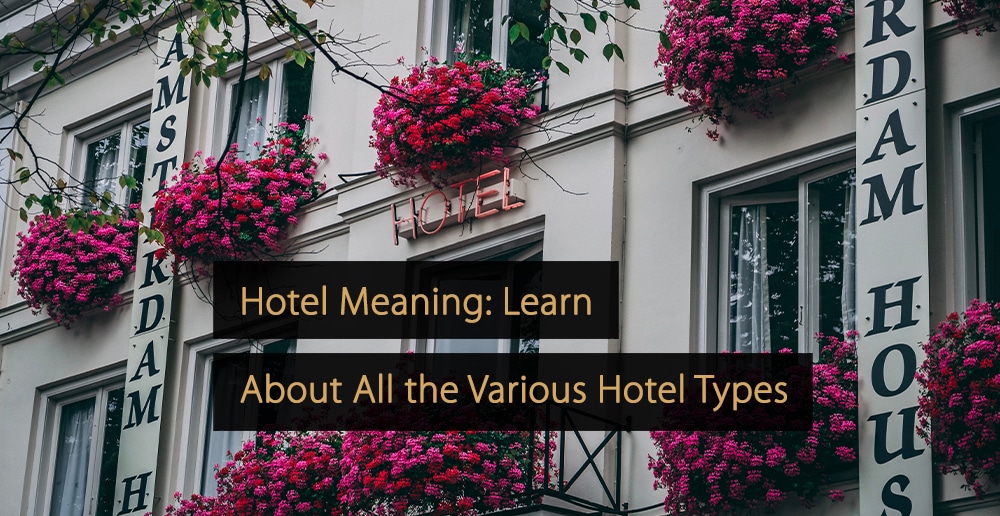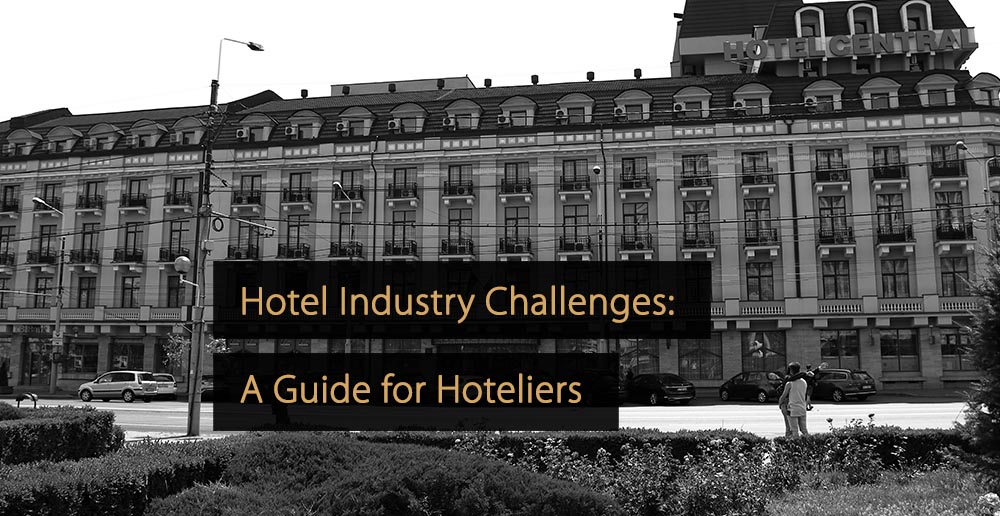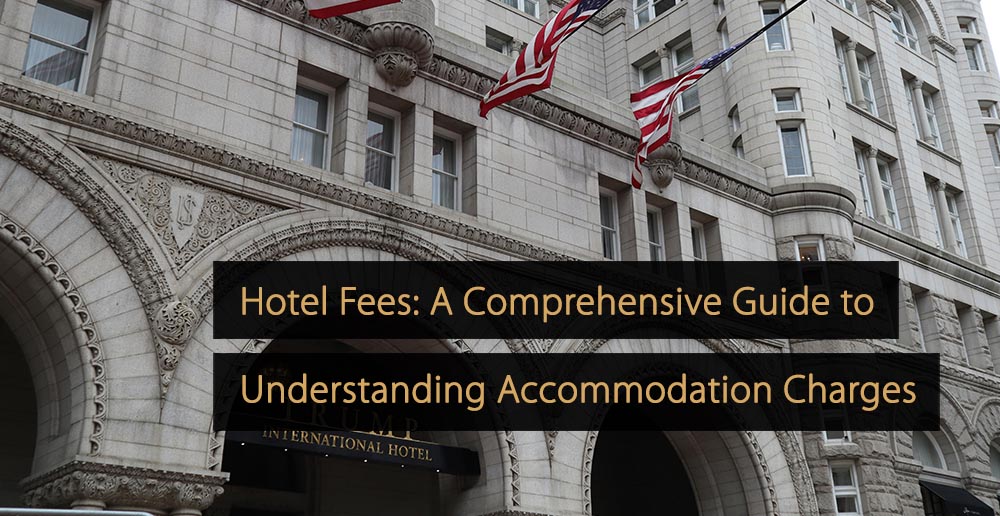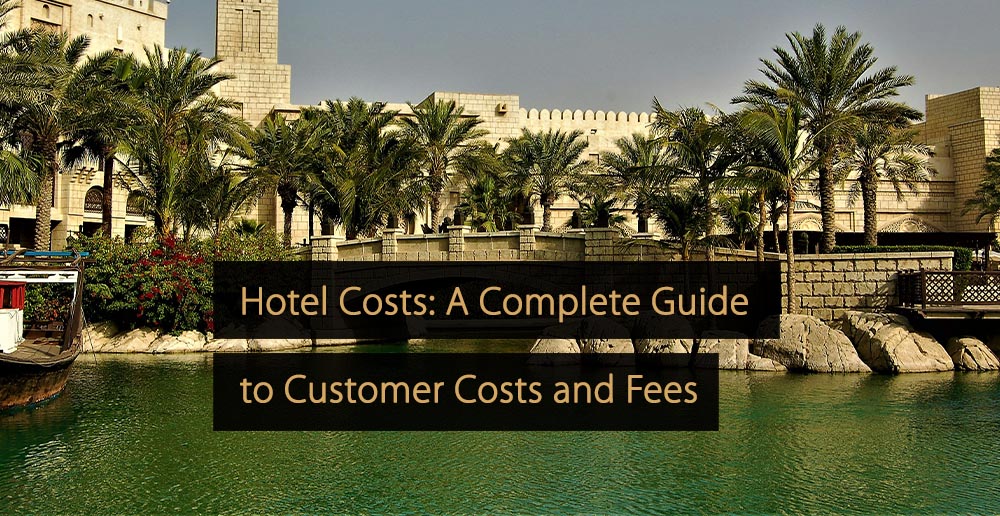Those working in hotel management positions and other senior roles should clearly understand what a hotel is and how it can be defined. However, it is also important to know about the different types of hotels. In this hotel meaning article, you can find a basic definition, learn about the history of hotels, and read a breakdown of the different property types considered part of the industry.
Table of Contents:
- Hotel Meaning
- History of the Hotel Industry
- What is the Meaning of Different Hotel Types
- Hotel Technology and Its Meaning to Hotel Success
- Coordination of Operations Meaning for Hotels
- The Purpose and Meaning of Hotel Departments
Hotel Meaning
First, it is worth taking the time to examine the literal hotel meaning and explore its origins. The word “hotel” itself has its origins with similar words, including “hospital” and “hostel”, with the former describing a place where visitors receive care, and the latter being a place where travelers can stay.
In the United Kingdom, the Hotel Proprietors Act 1956 defines a hotel as an establishment “offering food, drink and…sleeping accommodation, without a special contract, to any traveler presenting [themself] who appears able and willing to pay a reasonable sum for the services and facilities provided and who is in a fit state to be received.”
With this in mind, the meaning of a hotel can be summarised as a property that provides lodgings, food, beverages, and other services to paying guests. Some definitions insist that overnight stays are a key feature. It is also worth noting that the hotel industry usually describes hotels, motels, inns, B&Bs, and all similar properties.
History of the Hotel Industry
While the modern hotel’s meaning refers to properties that offer comfortable rooms, food, beverages, wi-fi, and various other services, it is worth learning about the industry’s history.
In truth, there have been facilities offering overnight stays to travelers for thousands of years. For instance, within ancient civilizations, there is evidence that visitors to different settlements could purchase overnight stays within an early form of hotel, such as an inn, and these often offered a bed and a stable for horses.
In Japan, the Nishiyama Onsen Keiunkan remained in operation and was established as far back as 705 AD. Guinness World Records recognized it as the world’s oldest hotel. It is often cited as one of the first businesses offering something akin to modern hotel services, including shelter, a bed, food, drinks, and access to hot springs.
During the Middle Ages, monasteries were often used as an overnight accommodation. At the same time, modern business practices and the concept of luxury hotels aimed at the wealthy began to emerge in the 18th century. The 19th century then saw rapid growth in the hotel industry, especially in Europe and North America, leading into the modern age.
What is the Meaning of Different Hotel Types
The meaning of “hotel” is rather broad, encompassing many different types of hotels. Some of the main examples of different hotel types are outlined in more detail below:
Chain Hotel
A business or owner operates a chain hotel as a part of a collective of properties. Marriott and Hilton are some of the most notable examples of brands running chain hotels. Those in management positions will usually be required to live up to standards that are applied to all properties in the chain.
For instance, the company owning a chain may issue clear instructions about what sort of hotel technology should be present and what should be included within rooms. Some chains allow their hotels to be managed more individually, but there is usually some standardization across the board.
Hostel
A hostel is a property within the hotel industry that offers low-cost accommodation to a group of people. Many hostels are aimed at specific demographics, such as students, or gap year travelers, and these properties will typically provide a form of shared accommodation, where guests stay in one room containing separate beds.
Facilities like bathrooms are shared, meaning a hotel will provide a more private experience. Yet, the affordability of hostels will generally serve as their unique selling point. It is also worth noting that many hostels will not provide food services but will offer a kitchen and other facilities for food preparation.
Motel
The word “motel” is a portmanteau, meaning motor hotel, which is a useful starting point when defining these properties. Essentially, a motel can be considered a low-cost hotel, with basic facilities, and these establishments were originally designed to host road travelers, including truckers and traveling salespeople.
With this in mind, motels are often situated away from the most populated areas, but close to major roads. Parking facilities will almost always be provided, and food and beverage facilities tend to be much more limited than with a hotel, meaning these properties function best as low-cost, short-stay lodgings for those with basic needs.
Video: What is a motel?
Boutique Hotel
Establishing a precise boutique hotel meaning can be challenging because there is no strict and agreed-upon boutique hotel definition. Nevertheless, these properties generally have 100 rooms or less and most commonly be situated within urban areas, close to popular destinations, venues, or shopping areas.
Although there are boutique chains, many of these hotels are managed independently, and they may have a theme or unique aesthetic to attract guests. A strong emphasis is placed on providing a distinctive guest experience, unlike the experience from larger chain hotels, while room rates may be higher too.
Bed and Breakfast
A bed and breakfast provides overnight accommodation and food and beverages, meaning hotel and B&B services have significant crossover. With that being said, a bed and breakfast will usually be a much smaller property than a hotel, and they are often privately owned properties, operated by live-in owners.
Due to this smaller size, bed and breakfasts tend to provide guests with a more personal experience, and it is common for guests and owners to have regular interactions over the course of a stay. While guests are given private rooms, some bed and breakfasts may require guests to share bathroom facilities.
Resort
The difference between resort and hotel meaning is relatively subtle but significant. Essentially, while both provide lodgings and various other services, such as food, drinks, and entertainment, a resort can be considered self-contained, offering a more luxurious, all-in-one experience.
In many cases, resorts are situated on islands, or in exotic locations away from urban areas. They will tend to offer more recreational activities, and resorts will attempt to provide guests with everything they need on-site, meaning they can function as a travel destination, rather than just a place to stay.
Business Hotel
A business hotel is a name given to any hotel primarily targeted toward business travelers. That said, it is important to note that the guests do not need to be exclusively business customers, meaning a hotel of this kind could also cater to leisure travelers, tour groups, and families.
Nevertheless, the hotel’s main focus will be on offering high-quality corporate services, including high-speed internet access, conference rooms, work areas, and providing access to transport. Most hotel marketing efforts will also likely target business and event travelers.
Inn
Inns are smaller properties that try to give guests a relaxed experience where they can feel “at home”. They will provide overnight lodgings, food, drinks, and some other services, but there will usually be fewer services than with larger properties, meaning a hotel or resort will generally be considered more luxurious.
An inn may offer guests a private bathroom and free Wi-Fi, but room service is likely limited or non-existent. Inns are often situated in smaller towns or near roads. They differ from motels because they are more geared towards multiple-night stays and not specifically aimed at road travelers.
Suite Hotel
Suite hotels refer to hotels that replace traditional hotel rooms with suites. Within the hotel industry, suites are defined as multiple connected rooms, usually separated by doors, which fall under one room number. This most commonly involves separating the bedroom from the living room area but may also include providing a separate kitchen.
While some hotels include suites within their property, the most widely-used suite hotel meaning or definition states that suite hotels exclusively provide suites, rather than single rooms. Suite hotels can differ in size, while star ratings can also vary, but most are considered upmarket properties, and some are geared towards longer stays.
Casino Hotel
As the name indicates, a casino hotel is a hotel that provides guests with access to an on-site casino. A casino connected to a hotel is likely to offer a variety of gambling facilities, from slot machines to live table games, and opportunities to participate in sports betting. Other forms of live entertainment are also common.
Many casino hotels are considered luxurious properties; after all, they usually cater to guests with lots of disposable income that can be used at the casino. Most of these properties will provide all of the usual hotel services, too, including lodgings, food, beverages, bars, restaurants, leisure facilities, and room service.
Flotel/Boatel
The names “flotel” and “boatel” are portmanteaus, meaning floating hotel or boat hotel, respectively. These hotels are properties that float on the surface of the water, and this will most often take the form of a cruise liner, houseboat, or similar vessel. However, some flotels may be conventional hotels, built on floating platforms.
Generally, flotels and boatels will have a relevant theme and be situated in rivers or harbor areas. A boatel could be a permanently moored boat, or one capable of taking guests on tours, similar to a cruise ship experience. In contrast, a flotel will almost always be a stationary floating hotel.
Conference Center
Conference centers that fall within the established hotel or guest accommodation definition provide both lodgings and meeting facilities. Access to a conference center of this kind will usually be sold as a package deal, providing admission to the conference in question and guest accommodation.
The major advantage of booking conference center accommodation is the easy access to the conference or meeting that is taking place. Most of these properties will be targeted toward corporate guests, so there may be a significant crossover with business hotels’ services, marketing strategies, and hotel trends.
Serviced Apartment/Residential Hotel
A serviced apartment or residential hotel is designed to provide long-term or permanent accommodation for guests, who usually sign a lease agreement with the property owner. This agreement will outline the period of time they will stay at the property and the amount of rent they will pay in total, or per month.
The rooms provided will commonly include a bedroom, a living room, a kitchen, and a bathroom, and housekeeping services are still provided. Still, these are less frequent than with a conventional hotel. It is common for guests in these properties to temporarily reside in an area, such as those on a work placement or training program.
Pop-Up Hotel
Finally, the widely accepted pop-up hotel definition or pop-up hotel meaning is a temporary structure that functions as a hotel while it is standing. These properties are often used to provide guest accommodation on a seasonal basis, or to coincide with other periods of high demand, such as around popular events.
Examples of times when pop-up hotels may be created include music festivals or high-profile sporting events. Some may also be set up to cope with the rising demand for guest accommodation during busy times of the year. Many pop-up hotels are connected to established chains, or connected to events, and they usually offer conventional hotel services.
Hotel Technology and Its Meaning to Hotel Success
Hotel technology has an important role in providing a high-quality guest experience, and hotel guests now have higher expectations in this area than ever before. This makes it important to keep up-to-date with the latest trends in this area, including emerging technology like robotics, artificial intelligence, and virtual reality.
In the article “Hotel Technology Trends: 16 Upcoming Innovations You Must Know”, you will find an overview of the emerging technology that is helping to enhance guest experiences and drive success within the hotel industry.
Coordination of Operations Meaning for Hotels
Hotels are complex businesses, with different departments that all need to work together to provide a quality experience. To achieve this, you must understand the meaning of hotel operations and how these operations can be coordinated through cross-departmental communication and continuous training.
In the article “Hotel Operations Guide: Learn How to Run Your Hotel Successfully”, you will learn about the main departments handling hotel operations and strategies for coordinating efforts.
The Purpose and Meaning of Hotel Departments
Hotels can be broadly divided into seven main departments: the management department, the food and beverage department, the front office department, the housekeeping department, and more. There can also be a significant crossover, meaning hotel departments may collaborate closely or share responsibility for some tasks.
In the article “Hotel Departments: Learn About All the 7 Sections of a Hotel, ” you can learn the meaning of hotel departments and understand how each department contributes to lasting success.
Conclusion
After reading this article, you should now be equipped not only with a basic hotel meaning or definition but also with a better understanding of the hotel industry’s history and the different types of hotels that exist.
More Tips to Grow Your Business
Revfine.com is the leading knowledge platform for the hospitality and travel industry. Professionals use our insights, strategies, and actionable tips to get inspired, optimize revenue, innovate processes, and improve customer experience.Explore expert advice on management, marketing, revenue management, operations, software, and technology in our dedicated Hotel, Hospitality, and Travel & Tourism categories.
This article is written by:
Hi, I am Martijn Barten, founder of Revfine.com. With 20 years of experience in the hospitality industry, I specialize in optimizing revenue by combining revenue management with marketing strategies. I have successfully developed, implemented, and managed revenue management and marketing strategies for individual properties and multi-property portfolios.









Leave A Comment